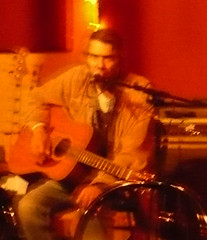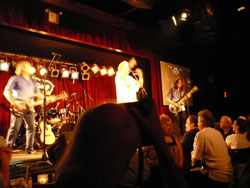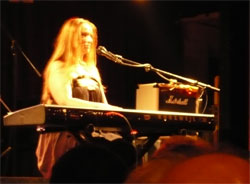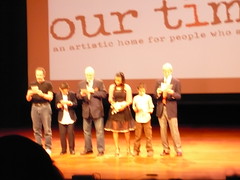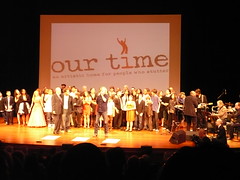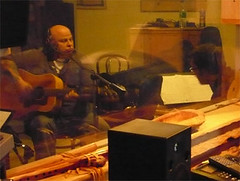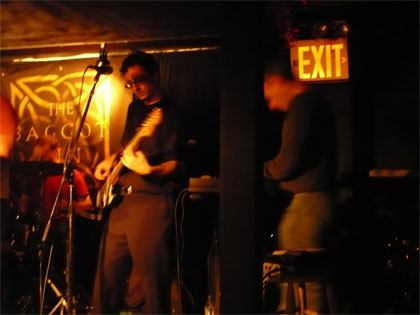It's been goshawful busy over here at the Round-Up, with summer and fall releases piling up and lots of good music bursting insistently out of the piles of magical plastic. There's something for nearly everyone in this week's edition, from bluegrass innovators and a blues traditionalist to a solo disc from a member of Matchbox 20 and a couple of sharp "comeback" CDs. Onward to the music…
Cadillac Sky, Gravity's Our Enemy
One of the most rewarding experiences a new music aficionado can have is to come upon a band that both fulfills and transcends a beloved genre. Cadillac Sky is every bit a bluegrass band, but the Texas quintet quietly expands the frontiers on its second CD, and the result is one of the best discs to have hit my mailbox this year.
They establish their country and bluegrass credentials right away, with principal songwriter Bryan Simpson's high-lonesome keen opening "U Stay Gone." Close harmonies, banjo picking, a call-and-response section, and a mournful fiddle solo from Ross Holmes all follow, building into and out of hummable choruses – and that's just the first song.
The tempo picks up with the nervously jumpy "Goodbye Story," which is topped with sweet-as-molasses harmonies, another inventive fiddle solo, short features for Simpson's mandolin and Matt Menefee's banjo, and a clever breakdown section. "Bible By the Bed" is a gentle, sad ballad with a standard country music structure under a catchy, pop-inflected melody which devolves into a tasteful, wordless coda.
"My Precious Waltz" brings a spooky Eastern European flavor, aided by a guest appearance from Dan Cantrell on musical saw. It serves as an introduction to the fast-picked "I Hate How Happy She Is," which draws a twisted classic-rock sound from a set of acoustic bluegrass instruments and also showcases banjo wizard Menefee, while Simpson wails, "Why can't she be as miserable as me?"
That sense of humor is one reason these extremely skillful musicians never sound too studiously virtuosic. The CD continues with sad songs, inventive instrumentals, and some very un-bluegrassy moments, like the quirky instrumental break in "Wouldn't Put It Past Love," the old-time jazzy verses of "Inside Joke," and the unexpected minor-chord changes and plucked rhythms in "The Wreck." Simpson's also handy with traditional country-music songwriting rhetorical devices, as evidenced by "It Won't Be Over You," which closes pithily: "When my bones grow weary of this world / And my days are numbered few / I might hang my head down in regret / But it won't be over you."
Donna Lewis, In the Pink
After making a couple of sultry splashes in the late '90s with hits like "I Love You Always Forever" and "Love Him," Welsh-born Donna Lewis took a hiatus to raise a family. Now she's back, picking right up where she left off with an excellent new disc of danceable electronica-pop. Many of the songs have a meditative bent but also just enough catch that one's ears stay perked up. The songs with the livelier beats (like "Shout" and "Obsession") should stand up to any sort of dance-club use or abuse, while the quieter moments (like "Kick Inside" and the folky "You To Me") have a thoughtful and slightly exotic quality, reminding me of Emiliana Torrini.
Lewis's breathy vocals get a little monotonous over the length of a full CD, but with this kind of music we're not usually asked to listen to one artist for 40-plus minutes anyway. Its natural habitat is the dance hall, or to set a mood. Within her chosen style, Donna Lewis, working with producer Gerry Leonard and mixers Kevin Killen (and on one track, Hector Castillo), is top quality.
Robbie Dupree, Time and Tide
You have to go back further than the '90s for Robbie Dupree's splash. The hits "Steal Away" and "Hot Rod Hearts" came on his 1980 debut. Their smooth but rhythmic jazz-influenced pop fit right in with Steely Dan and the Doobie Brothers, a style you don't hear too much these days.
Dupree has never quit, and his new disc should please loyal fans. Its nine tracks, mostly co-written by Dupree and session keyboardist David Sancious (Springsteen, Sting), sway gently with easygoing grooves. Vocally Dupree sounds as good as ever, if a bit mellowed, and there's a sprightly vitality to the arrangements. Some of my favorites: "Wrapped Around Your Finger," which resembles Sting's soft funk (though the similarity of the title to an old Police song is, as far as I know, coincidental); "Sugar Tree," which has more of a Doobie Brothers vibe; and "Blue Monday," which evokes memories of trips to the beach listening to Steely Dan and Boz Skaggs.
The ballad "Judgment Day" closes the disc on a thoughtful, vaguely haunted note of filial alienation. "My father was a sailor / He lived the life he loved… The years had made us strangers / And scattered us like stars." The character in the song never fully understands his father until the latter's death. Yet contemplative lyrics about the passage of time and resemblances to the sounds of past decades don't make this music an exercise in nostalgia. Dupree's sound and songwriting have a timeless quality. Solid writing and superior musicianship never go out of style.
James Dunn, The Long Ride Home
James Dunn's new record has a retro sound too, this time harking back to 1970s Los Angeles. Backing up the Jackson Browne-style vocals, though, lie classically solid songwriting and a smooth rock sound. The opening track, "Find My Way," is a dense, mostly two-chord drone that sets an effective mood but is a bit flimsy underneath. However, the album strengthens as it goes on. "Oak Tree" recalls Don Henley's "The End of the Innocence," and the disc really hits its stride with the undeniable "Oh My Don't Cry."
"The Long Ride Home" has a minor-key Southern rock flavor, while "Crush On You" revels in old-fashioned 50s-60s charm, which mixes nicely with hard guitars in the chorus. A highlight of the second half of the disk is the contemplative but moving "The Old Woman."
Phil Minissale, Home To Me
Phil Minissale is a young acoustic bluesman from Long Island, NY who's been rapidly ascending the ladder of recognition, and with good reason. Though his youthful voice hasn't acquired the gravitas we associate with traditional blues, these eleven songs are loaded with down-home honesty.
Minissale respects the traditions but writes his own songs. He tickles the guitar with assurance but without excess flash or flab, and happily offers the spotlight to his guest musicians, notably Ken Korb on harmonica and Red Molly's Abbie Gardner on dobro.
His approach to blues guitar traditions is reverent, but not so careful and precious that it sounds academic, as can sometimes happen with students of blues guitar. Finally, lest anyone claim that country blues is a game for the grizzled, let's not forget that Robert Johnson never made it past age 27.
Securely recommended for fans of traditional blues and folk.
Jason Vigil, Sometimes Always
Jason Vigil has matured both as a songwriter and performer since his uneven previous disc. On his new seven-song EP he's reined in the histrionics, resulting in a steady churn of catchy pop-rock. While you couldn't call his brand of earnest, guitar-based melody-making an original sound, it's tasty, well-made comfort food for the ears.
The Break and Repair Method, milk the bee
Matchbox 20 drummer Paul Doucette leaves the skins to Ryan MacMillan and steps out in front for his first solo CD, recording under the name The Break and Repair Method. Richly produced, with heavy emphasis on Doucette's powerful pounding on the piano and his slightly screechy, urgent voice, these ten tracks show a mastery of power-pop style and enough sonic originality to make the project stand out from the pack. (Part of that no doubt comes from co-producer Greg Collins).
Contributing musicians include Veruca Salt's Nina Gordon (whose own solo efforts have been very unjustly ignored) and Jellyfish's Roger Manning. But the disc has a consistent intensity that's all Doucette.
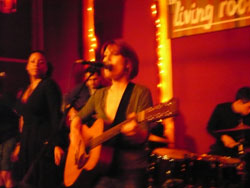
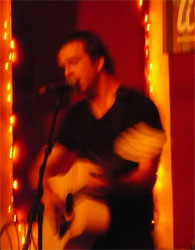 just happens to be playing that same night at the same club, or just around the corner. Last night we arrived for Laura’s show and found that Chris Trapper was playing right after her.
just happens to be playing that same night at the same club, or just around the corner. Last night we arrived for Laura’s show and found that Chris Trapper was playing right after her.